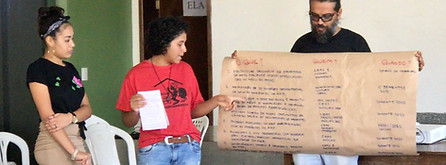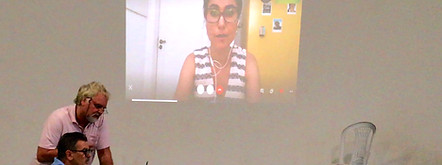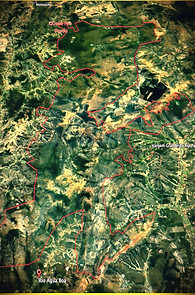
The Rio Pardo
must not die!
The ‘Geraizeiros’
in the upper region of the origins of the Rio Pardo
Geraizeiros are small hold farmers. For centuries they have formed a tightly knit community and practice a collective-like economy. They are self-sufficient, practice traditional and environmentally conscious agriculture, and campaign to preserve their forests and rivers.
Local activists

João Chiles
"Geraizeiro",
Agronomist
has studied in São Paulo, but has now returned to his parents and his roots.
He supports the traditional community in the mountains at the source of the Rio Pardo in order to preserve the river.
bleibt.

Geraldino José da Silveira
is a hundred-year-old ‘Geraizeiro’ who has lived his entire life at the main source of the Rio Pardo.
An activist from the very beginning, he was already interviewed in the early 1990s about the dying river!

Maria Lúcia de Oliveira Agostinho
"Geraizeira" Activist,
Co-founder and former director of the local women's cooperative.
Living at a tributary of the Rio Pardo in Agua Boa, she is co-responsible for the resource protection area created in 2011, in which the many sources of the Rio Pardo are located.
Protection of the spring waters:
Agua Boa s located at a tributary of the Rio Pardo. This is where the struggle for the protection of the springs began. It ended successfully after a long struggle, thanks to a grassroots women's cooperative.
The licenses for the cultivation of eucalyptus monocultures, issued by the government in Minas Gerais in the 1980s, were stopped in 2011 in the area of the springs, though some legal details still remain an unresolved issue today.
In this remote corner, in the middle of no-man's land in the mountains, lies the most important spring water of the Rio Pardo. Our journey begins here, at the rock paintings from prehistoric times:
A return from a eucalyptus monoculture
to traditional cultivation:
This is the ‘Geraizeiro’ community ‘Vereda Funda’, which, after thirty years of eucalyptus cultivation by multinational companies, successfully fought for their land and a return to their traditional way of life.

Ritinha Soares
"Geraizeira" Activist,
who, together with her husband and her community ‘Vereda Funda’, organized the occupation of a eucalyptus monoculture on their traditional territory and succeeded in reclaiming part of their land. Today, the group operates in a resource efficient and sustainable manner in this area, in collaboration with the local women's cooperative.

Uli Ide
Agronomist,
HEKS/EPER Special Representative for Rural Development, Latin America.
https://www.heks.ch/was-wir-tun/landesprogramm-brasilien
Supported Ritinha and the community 15 years ago in the regeneration of the Cerrado in former eucalyptus cultivation areas.
He lives with his wife Maria Helena between Montes Claros, Minas Gerais, and the RESEX Canavieiras in Bahia.

Ronaldo de Almeida.
Agricultural Technician
supports the cooperative with the help of his employer CAA (Centre for Alternative Agriculture).with know-how and expertise.
A primary function of his is to act as an intermediary between the state and the municipalities in order to finally legally consolidate the resource protection area of the origins of the Rio Pardo.
Workshop organized by the Rio Pardo Network:
A story of the mid-river section
They met in February 2020, in Taiobeiras, a city located in the catchment area of the Rio Pardo with serious water problems. Extensive monocultures such as coffee cultivation, extensive livestock farming and extraction of primary mineral raw materials are the main causes.
Invited were the members of traditional communities - Geraizeiros, Quilombolas and fishing communities, living in the upper, middle and lower section of the Rio Pardo as well as representatives of scientific institutions, politics and international NGOs.

The sharing and exchange of experiences among local members and NGO academics, enriched by a field visit, encouraged lively discussions on the continuing development of the Rio Pardo Water Observatory.
Future international networks for various research projects and the collection of hydrological data were discussed, in particular with the Brazil HUB of the University of St. Gallen and the University of Zurich
(Crowd Water App)


Marilene Alves de Souza (Leninha)
Biologist
Member of the Parliament of Minas Gerais, President of the Human Rights Commission, long-standing coordinator in NGOs and grassroot movements in Brazil, expert on agricultural development, food security and water management; has visited Germany/Switzerland, has spoken at the UN.

Maria Helena de Souza-Ide
Pedagogue and retired university professor. Her research has involved her with Quilombola communities.
https://www.uni-kassel.de/upress/online/frei/978-3-86219-150-5.volltext.frei.pdf
Today she supports projects with young people in ‘Vereda Funda’ and is a member of an inter-disciplinary research group for social and environmental issues in the network for the protection of the Rio Pardo.

Welinton Rodrigues Nascimento
Administrative specialist and management consultant. Founder of the Citizens' Initiative "Cidade Nossa" (Our City) in Cândido Sales.
Supports the communication work of the network for the protection of the Rio Pardo in the Vitoria da Conquista region.
Leninha; see more
Grazing pasture and shrimp farms
make the basin of the Rio Pardo barren and degraded
Cocoa has been cultivated for centuries in the shadow of the ‘Mata Atlántica’ - the coastal rainforest - in the littoral area of the Rio Pardo. This should actually have a rather favourable effect on the water balance.


However, the delta is on the brink of collapse as it is being drained for additional pasture. Mangroves are cut down for shrimp (prawn) farms and the river water is diverted into them. The aquacultures use large quantities of antibiotics for mass breeding, which then pollute the rivers and the sea.
The "RESEX" Canavieiras:

In 2006, the local fishermen and seafood-collecting women of Canavieiras, in the delta of the Rio Pardo in Bahia, won a so called ‘RESEX’ - a land and sea reserve for the protection of natural resources.
A RESEX is state-owned land which is handed over by the government to traditional communities for the sustainable use and protection of their ways of life, and thus can no longer be claimed by foreigners and outsiders.
The fishermen's self-government is subject to strict conditions regarding environmental protection, exploitation and management.
The RESEX also includes, for example, these ‘Quilombola’ women, descendants of former slaves from Africa. They work as ‘Marisqueira’, collecting crustaceans and seafood in the mangrove forests of the Rio Pardo estuary.
They all participated in the seminar in Taiobeiras in order to save the Rio Pardo.


Lilian Santana
Marisqueira,
is on the board of the fishing cooperative, the women's community and the Marisqueiras in their Quilombo community ‘Campinhos’..

Lucia Carvaltes Jesus
Marisqueira,
Member of the Fisheries Cooperative
Thanks to her income as a Marisqueira, she was able to send her son to university.
Environmental damage, pollution, deforestation of mangroves and increasing competition mean that the Marisqueiras now have to spend an inordinant amount of time even in the RESEX to collect small crabs and mussels.
By selling this local delicacy they feed their families.

The Marisqueiras are members of the Fisheries Association.
During a predefined closed season, which guarantees reproduction of the crustacean population, they will now - just like the fishermen - be able to claim a small compensation for the income lost during that time, thus contributing to the conservation of fish and crabs in the mangroves.

João (Barba)
Gonçalves
Fisherman
President of the umbrella organisation of the AMEX fishing community.
Trade unionist, environmentalist, activist, father figure and soul of his Quilombo community ‘Campinhos’.

Jailton Santana
Fisherman
Fisheries President
Quilombo Community ‘Campinhos’

The artisanal fishermen will sometimes chug along the coast in their small boats for days on end or row into the mangroves. Thanks to the RESEX, they no longer have to fight against industrial scale fishing, but for a long time prey has nevertheless been meagre due to water pollution- and shortage. The education and health systems in their villages are very poor.
Disasters hit RESEX fishermen hard. In 2019, an oil spill polluted their mangroves and beaches for months. The cause has not yet been found.
Thanks to their efforts and the support of the citizens of Canavieiras, they were able to clean the oil off the beach before it contaminated the mangroves as well.

Then, in 2020, came the loss of earnings as a result of the Corona crisis. Due to politically motivated trench warfare in Brazil, it reached one of the highest global infection and death rates. Fish and seafood sales collapsed. The progress achieved in environmental protection and sustainability along the Rio Pardo is now in jeopardy.
Small farmers and fishermen fear that the pressure of commercial interests could lead the authorities to relax the protective regulations.
At the end of September 2020, this fear became partly reality when the Ministry of Environment decided to deforest 50% of the existing mangrove forests outside the protected areas to make room for tourism and other projects such as crab farming or wind farms, but to maintain the existing guaranteed RESEX. Although a federal court stopped this project 24 hours later, the final word on the matter is still far from over.
Notification on own account:
The filming was finished by the end of February 2020,
We are in contact with all the people involved; as far as they are concerned, they are doing well regarding Corona Virus.
Local NGOs are currently not only taking care of saving the river, they are now also distributing food baskets to families whose children normally have their only warm meal in the now closed schools.


